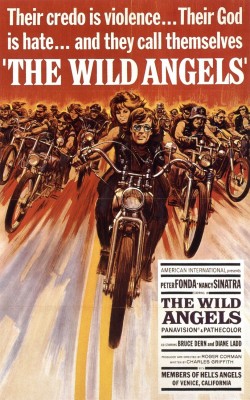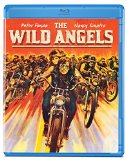| Reviews & Columns |
|
Reviews DVD TV on DVD Blu-ray 4K UHD International DVDs In Theaters Reviews by Studio Video Games Features Collector Series DVDs Easter Egg Database Interviews DVD Talk Radio Feature Articles Columns Anime Talk DVD Savant Horror DVDs The M.O.D. Squad Art House HD Talk Silent DVD
|
DVD Talk Forum |
|
|
| Resources |
|
DVD Price Search Customer Service #'s RCE Info Links |
|
Columns
|
|
|
Wild Angels, The
I'd seen The Wild Angels a couple of times before (once in 35mm, once on DVD) but was underwhelmed. My reaction then was similar to Leonard Maltin's, who in his TV Movies guide said is was "OK after about 24 beers." Some of the Hell's Angels' violent carousing goes on too long and, near the end of the film, star Peter Fonda delivers a monologue attempting to justify a lifestyle that, seen today, borders on high camp.
Watching Olive Films' excellent Blu-ray of The Wild Angels really turned my opinion around. The characters in Easy Rider are sympathetic hippies who, though tangentially smuggling coke, pretty much just want to be left alone. But the bikers in The Wild Angels are aimless, racist thugs engaging in everything from assault and battery to gang rape and murder without a whiff of remorse. They are definitely not the Robin Hood-imagined, psychologically complex heroes of Bonnie and Clyde, nor the idealistic free spirits of Easy Rider. The Wild Angels is less graphic yet far more brutal than the former, and more honest and uncompromising than the latter. The Wild Angels is widely recognized for so successfully capitalizing on the emerging counterculture youth market, but its real achievement is its incredible daring in so accurately capturing this underbelly of disgruntled society on so many levels.
Some historical perspective: When my parents, then in their mid-20s, saw The Beatles perform on that February 1964 episode of The Ed Sullivan Show, they thought those well-dressed moptops looked like freaks. Imagine, then, what it must have been like just two years later for drive-in audiences experiencing The Wild Angels and its violent "heroes," whose beach house chokes with Nazi paraphernalia. (Kudos to art director Leon Ericksen.) Alarmingly, even the movie's title card subverts its first letter (the "T") into a swastika.
Peter Fonda plays Heavenly Blues, the leader of a Hell's Angels motorcycle gang in Venice (though, possibly for legal reasons, their leather jackets clearly identify them as "Hell's Angels San Pedro"). Blues visits his best friend, Loser (Bruce Dern), working at an oilrig. One of the workers there (Corman stalwart Dick Miller), a veteran who'd fought in Anzio, is offended by the Iron Cross Blues wears. "We used to kill guys who wore that kind of garbage," he growls. Blues and Loser threaten to rip out his teeth with a pipe wrench. Loser is fired.
Blues has a line on a stolen chopper in Mecca, a desert community east of Los Angeles. They and his gang bust into a Mexican chop shop and after a few racial slurs rumble until a pair of motorcycle cops arrive. Everyone flees, but Loser, without a bike, steals a police bike, hotly pursued by the other officer on his. Loser is shot seconds before the cop loses control of his motorcycle and is killed. In critical condition, Loser is taken under guard to a nearby hospital.
Spurred on by the gang, as well as Loser's increasingly distraught girlfriend, Gaysh (Diane Ladd, married to Dern and pregnant with actress Laura Dern at the time), Blues decides that the gang is going to "rescue" Loser from police custody. With Blues's girl, Mike (Nancy Sinatra), acting as a decoy, they whisk the critically ill Loser back to their beach house (assaulting a black nurse in the process), even though it's clear their actions have condemned Loser to an imminent death.
Corman hired frequent collaborator Charles B. Griffith to write the script, which was eventually passed along to ambitious aspiring filmmaker Peter Bogdanovich (he can be glimpsed in the film leading the locals who rush into the cemetery). Bogdanovich later claimed he rewrote about 80% of the script. The final film has story and character elements favored by both men, so it's impossible to say who wrote what but, regardless, it's notable for piling on reprehensible behavior by the Angels in every scene. Sometimes their actions are broadly theatrical, like their trashing of a church and assault on its minister (Frank Maxwell, from Corman's The Intruder), at other times subtle, like the neglected, screaming baby in the swastika-filled background (held by biker chick Gayle Hunnicutt) while Loser is on his deathbed.
Corman's guerilla style of filmmaking results in a lot of shots technically lacking sharp focus, but he and cinematographer Richard Moore (The Reivers, Sometimes a Great Notion) expertly use the wide Panavision frame throughout, and the movie looks great on big screens.
Corman was always savvy enough to hire talented, hungry actors willing to take chances. (Reportedly, West Side Story's George Chakiris was Corman's first choice to play Loser, but he dropped him when the actor wanted to be doubled on the bike). In the movie the principals are clearly seen doing all their own riding, and as the survivor of a particularly nasty motorcycle accident, I blanche watching them all riding about without helmets.
The only remotely sympathetic character that the audience can identify with is Diane Ladd's Gaysh. It's a terrific performance, yet even her character, one that one suspects ran away from a "good," conventional family to join the Angels, never disowns her association with the gang, even after she's gang-raped by several of its members.
Fonda's Blues engenders no sympathy. He's merely a self-destructive, self-absorbed fatalist, one whose beliefs, basically antiauthoritarian and adhering to no moral code, trump the rights of others. The ending is foreshadowed throughout; in one scene he ditches loyal girl Mike for sex with paunchy, middle-aged biker chick Momma Monahan (Joan Shawlee). That monologue, countering minister's Maxwell's conventional Christian eulogy, which always seemed unintentionally hilarious, now plays deliberately shallow: "We wanna be free! We wanna be free to do what we wanna do. We wanna be free to ride. We wanna be free to ride our machines without being hassled by The Man! ... And we wanna get loaded. And we wanna have a good time. And that's what we are gonna do. We are gonna have a good time... We are gonna have a party."
Video & Audio
Olive's HD master of The Wild Angels, provided by MGM, looks great. Because of the way it was made, various shots are soft and out-of-focus slightly (or a lot) but then, a cut or two later it always snaps back into 2.35:1 widescreen crystal clarity. The color (original prints by Pathé) throughout is likewise impressive. The DTS-HD Master Audio mono (with no other language options or subtitles) is likewise strong. No Extra Features, a shame for this titles really cries out for supplements. Note: Running times, including on Olive's packaging, usually claim 93 minutes, but this cut at least is considerably shorter, clocking in at 86 minutes. I have no explanation for this.
Parting Thoughts
One of the seminal ‘60s films, Roger Corman's The Wild Angels is a must-see, particularly in the form of this excellent high-def transfer, despite the lack of extras. Highly Recommended.
Stuart Galbraith IV is the Kyoto-based film historian and publisher-editor of World Cinema Paradise. His credits include film history books, DVD and Blu-ray audio commentaries and special features.
|
| Popular Reviews |
| Sponsored Links |
|
|
| Sponsored Links |
|
|
| Release List | Reviews | Shop | Newsletter | Forum | DVD Giveaways | Blu-Ray | Advertise |
|
Copyright 2024 DVDTalk.com All Rights Reserved. Legal Info, Privacy Policy, Terms of Use,
Manage Preferences,
Your Privacy Choices | |||||||














